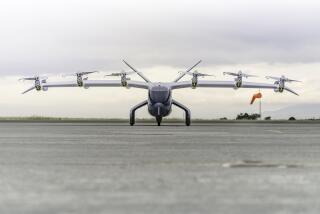Firm plans to restart airport security express service
- Share via
It has been nearly a year since a new screening service to zip passengers through airport security abruptly shut down, sending 160,000 paying customers back to regular passenger lines.
FOR THE RECORD:
Express airport security: An article in Monday’s Business section about a new security screening service for airline passengers said the company, Clear, planned to serve Los Angeles International Airport and expected to start service this summer. A Clear spokeswoman says the company hopes to offer the service at LAX but has no definitive plans to, and it expects to enroll new customers this summer, with service in selected major airports expected in the fall. —
But the defunct screening service is coming back under new ownership, with plans to offer the service at Los Angeles International Airport. The service, called Clear, is expected to start again this summer.
Travelers who sign up for Clear pay $179 a year to undergo an identity check that includes fingerprints and retinal scans. Once they pass the clearance, the members get a special card that lets them pass through a dedicated security line at participating airports.
New York-based Alclear bought the assets of Clear’s previous parent company out of bankruptcy and assembled a board of directors that includes Michael Chertoff, the former U.S. secretary of Homeland Security.
To get the program off the ground, Clear last week hired Jim Smith, the former director of properties for JetBlue Airways Corp., to be chief operating officer. Mark Ahasic, a former aviation consultant and senior manager at JetBlue, was hired as vice president of business development.
When its parent company went bankrupt, Clear operated at 18 airports. The company’s new managers say they will give the service to customers who bought memberships before the bankruptcy and hope to open Clear security lines at airports across the country, including LAX.
“We look forward to partnering with airports nationwide, regulators and lawmakers to ensure Clear’s success,” said Caryn Seidman-Becker, chief executive of Clear.
Few firms cover in-flight Web use
While nearly every major airline is installing equipment so passengers can surf the Web at 35,000 feet, most businesses do not reimburse employees who pay for Internet access on airplanes.
According to a survey by Business Travel News, only 34% of the 230 businesses who were asked said they would reimburse employees who use a company credit card to pay for the Internet access.
An additional 7% of the companies said they would reimburse employees only on intercontinental or long-haul flights.
This may trigger some frustration in corporate America because nearly 65% of all business travelers in the U.S. carry laptop computers on board airplanes, according to a survey by Aircell, one of the nation’s leading providers of airline wireless Internet.
But then again, the cost of Internet service on most airlines is modest, typically ranging between $5 and $13, depending on the length of the flight.
Exec’s tips for easier travel
As executive of Virgin America, the only California-based airline, David Cush spends plenty of time in the air.
He estimates that he boards an airplane eight to 10 times a month and has been more than a frequent flier since starting his career with AMR Corp.’s American Airlines in 1989.
Based on all his years of travel experience, Cush offers some tips for making business travel easier.
First, when booking lodging, Cush will return to the same hotel in the same city time after time to avoid surprises. “It takes a lot of the guesswork out of it,” he said.
Second, he said, pack light to move through airports quickly. Whenever possible, he tries to get everything he needs in a carry-on bag. “On most trips, I bring one suit, plenty of shirts and different ties.”
To speed through airports, he always has his identification and tickets ready when he lines up at a gate or security checkpoint.
But picking the right line is crucial, he said. In security lines, he tries to find the row that is moving fastest. “Some X-ray operators are simply faster than others,” he said.
And finally, Cush said he tries to avoid queuing up behind people who are likely to slow down the line, including families with baby strollers and people with a lot of body piercings that may set off metal detectors.
“So, when you get to the queue, see who is in front of you,” he said. “Generally, try to get behind people who look like they have done it before.”
More to Read
Inside the business of entertainment
The Wide Shot brings you news, analysis and insights on everything from streaming wars to production — and what it all means for the future.
You may occasionally receive promotional content from the Los Angeles Times.










